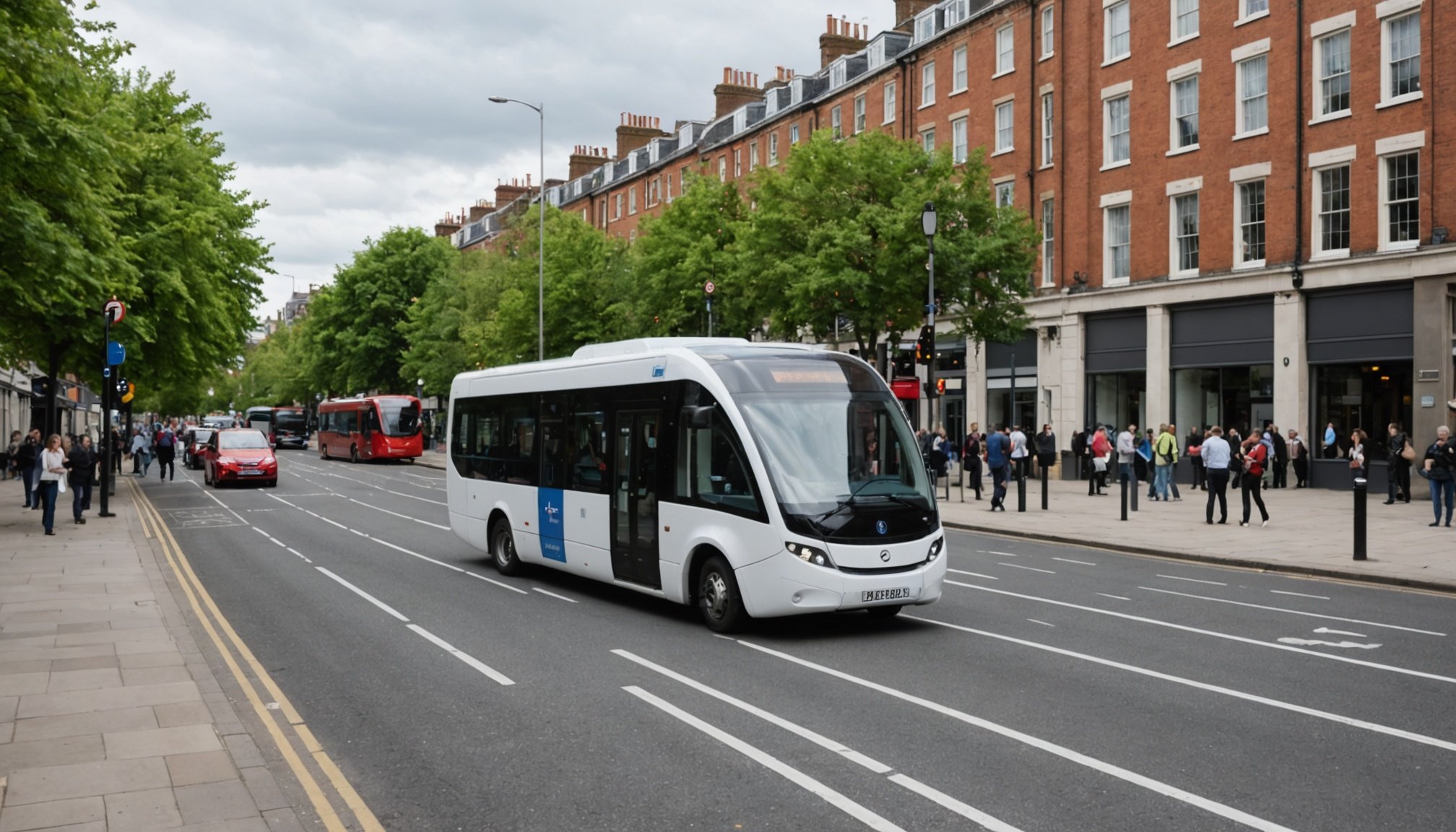Overview of Smart Transportation Technologies
Smart transportation revolutionizes how we move within urban spaces. It encompasses a range of innovative technologies, including autonomous vehicles, smart traffic lights, and public transport apps. These technologies transform urban mobility by enhancing the efficiency and sustainability of transport systems. Embracing such advancements is crucial for evolving modern infrastructure needs in densely populated cities.
Urban mobility is experiencing a paradigm shift due to the integration of technology. Efficient transportation is vital for the economic and social dynamics of any city, promoting better connectivity and reduced congestion. Traditional transport systems are often burdened by inefficiencies, pollution, and delays. Thus, integrating smart transportation solutions addresses these issues effectively.
Also read : Harnessing smart grid innovations for enhanced energy distribution efficiency in the uk
Central to this modernization are big data analytics and the Internet of Things (IoT). With real-time data and interconnected systems, cities can optimise traffic flow, reduce travel times, and improve public transport reliability. Together, these tools form the backbone of future-ready urban environments, enhancing transportation’s role in daily life.
By focusing on the technology benefits, cities can make informed decisions, ensuring seamless mobility. Consequently, advancing technology is essential to create resilient and adaptable urban transport frameworks. Recognising this importance, cities are increasingly investing in smart transportation technologies.
Have you seen this : Transforming UK Healthcare: The Impact of Wearable Technology on Patient Monitoring
Benefits of Smart Transportation Technologies
Smart transportation technologies are integral in addressing the pressing issues of urban congestion and air quality. By utilising real-time data and connected systems, cities can achieve significant reductions in traffic congestion, leading to shorter travel times and increased convenience for commuters. This not only eases urban strain but also optimises the use of existing infrastructure without the immediate need for costly expansions.
Enhanced public transport efficiency is another notable benefit of smart transport systems. These technologies improve service reliability, making public transportation a more attractive option for residents. This shift can lead to reduced dependence on personal vehicles, further alleviating traffic woes and conserving urban space.
In terms of environmental sustainability, smart transportation initiatives offer promising solutions. Fewer vehicles on the road and optimised routes contribute to better air quality by lowering overall emissions. As a result, the adoption of these technologies aligns with broader goals of promoting ecological wellbeing in densely populated areas.
Finally, smart transportation fosters a more resilient urban environment by enhancing public transport efficiency. Integrating green technologies and smart systems supports a cleaner, healthier ecosystem, reflecting the city’s commitment to future-oriented development.
Case Studies of Smart Transportation in UK Cities
In the realm of smart transportation, the UK has set noteworthy examples, demonstrating success across various cities. London leads with its intelligent traffic management system, enhanced by real-time data from numerous IoT sensors. These installations allow city planners to optimise traffic flow, minimising congestion and improving travel times for commuters.
Another prime example is Manchester, where the integration of public transport apps has revolutionised urban mobility. These apps provide real-time updates on transport schedules, making it easier for residents to plan their journeys efficiently. The introduction of contactless payment systems further enhances convenience, fostering greater adoption of public transport options.
Meanwhile, Edinburgh has made significant strides in electric vehicle adoption as part of its smart transportation strategy. By installing numerous charging stations and offering incentives for electric vehicle purchases, the city encourages citizens to embrace greener transport options. This commitment not only promotes environmental sustainability but also supports the reduction of urban air pollution.
Smart transportation case studies in the UK highlight the importance of strategic investments in technology for modern infrastructure. These successful implementations illustrate the transformative potential of smart transport systems, providing inspiration and a blueprint for other cities globally.
Innovations Driving Smart Transportation Forward
The landscape of smart transportation is continually evolving, propelled by cutting-edge innovations shaping urban mobility. A primary focus lies in the development of autonomous vehicles, which are set to redefine commuting by promising reduced traffic congestion and improved safety standards. These self-driving vehicles rely heavily on sophisticated sensors and advanced algorithms to navigate urban environments without human intervention.
The integration of IoT in both traffic management and public transport systems presents another transformative wave. By facilitating real-time data exchange, these interconnected devices offer cities enhanced capabilities to monitor and manage traffic flow efficiently. This leads to more reliable transit times and increases the usage appeal of public transportation networks.
Additionally, the role of big data and analytics cannot be overstated. These tools enable city planners to derive actionable insights from vast data pools, optimizing route planning and infrastructure maintenance. With their capabilities, cities can anticipate and mitigate potential disruptions, ensuring a smoother transportation experience for residents.
Together, these innovations contribute to smarter city initiatives, creating environments where urban transportation systems are more efficient and responsive to changing demands. They lay the groundwork for a future where technology seamlessly enhances mobility and city living.
Challenges and Barriers to Implementation
Implementing smart transportation technologies comes with distinct challenges that cities must overcome. One significant barrier is the financial challenges faced by municipalities. With tight budgets, cities often struggle to allocate sufficient funding for advanced transportation systems, which require substantial investment in infrastructure and technology upgrades.
Another hurdle is the public resistance to technology adoption. Many citizens may harbour concerns about privacy, safety, and the reliability of new systems. Such resistance can slow down the adoption process, requiring cities to invest in awareness campaigns and demonstration projects to build trust and acceptance among the public.
Moreover, regulatory hurdles stand as formidable obstacles. The deployment of technologies like autonomous vehicles and IoT infrastructure must navigate a web of regulations to ensure compliance. These regulations must evolve to keep pace with advancements, but the slow nature of policy adaptation can delay implementation.
Lastly, data privacy concerns are paramount, particularly with extensive data-sharing requirements intrinsic to smart systems. Ensuring robust data security while maintaining user privacy is crucial, necessitating stringent measures and clear guidelines. Addressing these challenges is imperative for the successful rollout of smart transportation initiatives.
Future Outlook for Urban Mobility with Smart Technologies
The future of urban mobility is set to undergo significant transformations driven by smart technologies. As cities grapple with mounting challenges, there is a growing trend towards collaborative efforts between the public and private sectors. This partnership encourages innovation and resource-sharing to address urban transportation needs efficiently.
Looking ahead, key smart transport trends are expected to revolutionise city planning. Among these are the expansion of autonomous vehicle networks, further integration of IoT systems in traffic management, and the use of big data analytics to fine-tune transport infrastructure. These advancements should lead to more connected, fluid, and efficient urban environments, seamlessly merging technological progress with mobility solutions.
Sustainable urban planning is increasingly a priority. Cities aim to reduce environmental footprints as part of their development strategies, focusing on enhancing air quality and reducing congestion. Smart technologies can facilitate this by supporting green transportation solutions, like electric vehicles and bike-sharing schemes, promoting ecological wellbeing.
Overall, smart technologies are poised to redefine how people navigate cities in the coming decade. Their implementation not only offers potential solutions to current urban mobility challenges but also sets a foundation for sustainable development and efficient city planning.

